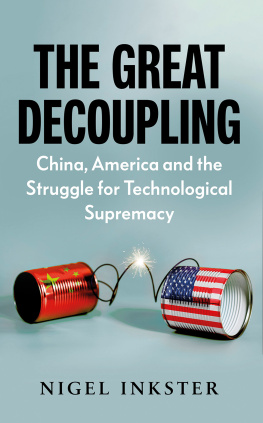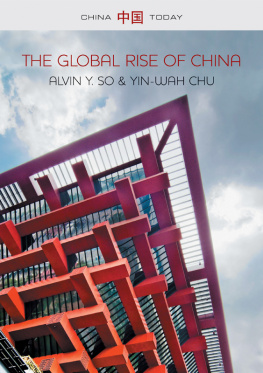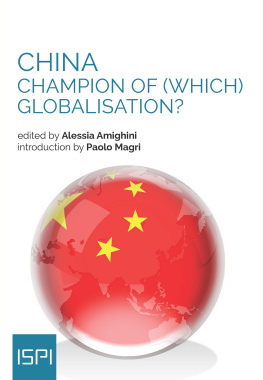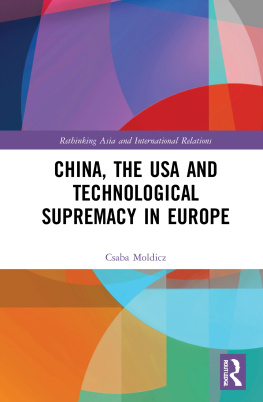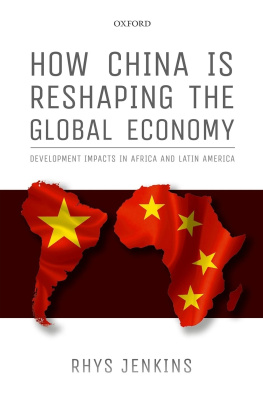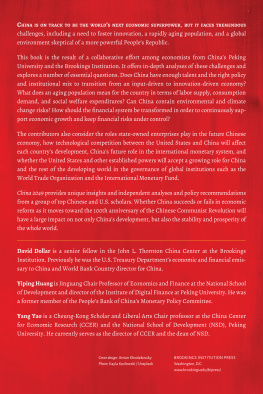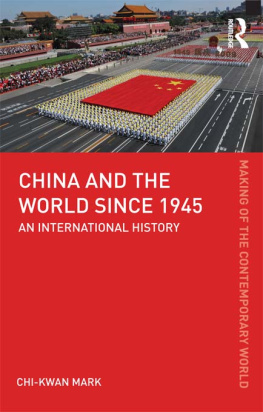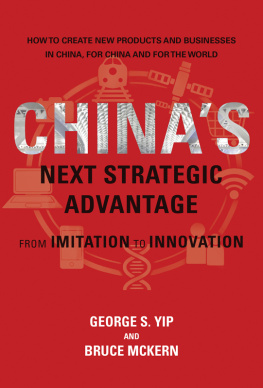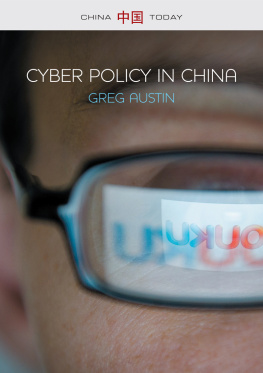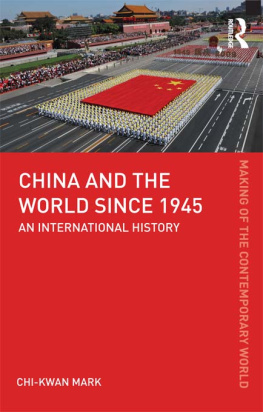Contents
Page List
Guide
Technology is at the heart of the contest between the United States and China for global supremacy. This book is notable for combining a sharp understanding of the technological question with the knowledge of its historical and political context. If the contest ends up creating a world divided into two separate spheres, our most cherished beliefs about progress and globalisation will be shattered. Is this inevitable? Nigel Inkster will guide you through this essential question.
Bruno Macaes, formerly Portugals Europe minister (201315) and author of Belt and Road: A Chinese World Order and History Has Begun
Linking his knowledge of China past and present to fascinating detail of Chinas achievements and aspirations in advanced technology, Nigel Inkster provides a powerful and compelling narrative of the decoupling of China and the United States. You will learn much of importance from this book.
Lord Mervyn King, former Governor of the Bank of England
Former senior official and Mandarin speaker Nigel Inkster proves a sure-footed guide to the consequences of the collision between the US as global superpower with a re-emergent and emboldened China. His book provides a compelling account of how the Chinese now think about themselves, their rediscovery of their technological tradition, and what it is about the Chinese state-directed internet and its use to control their vast population that leaves Western liberal democracy at serious risk from the great decoupling. Highly recommended.
Professor Sir David Omand, GCB, former Director of GCHQ
This is a superbly written, cogently argued, and insightful discussion of Chinas digital rise. It needs to be read by all concerned about the deepening rivalry between China and the USA.
Hans van de Ven, Professor of Modern Chinese History, University of Cambridge
Nigel Inkster has written a timely, sane and compelling account of the techno-strategic contest that will shape the world of the 2020s and beyond. Beyond its insightful analysis, The Great Decoupling also traces the policy contours of great-power coexistence as the alternative to a 21st century Great War.
Professor Rory Medcalf, head of the National Security College, Australian National University, and author of Indo-Pacific Empire
A lucid, pragmatic and succinct overview of where the worlds second largest economy currently stands and what it might look like as it moves towards number one status. Inkster draws on his long experience, both in dealing with China and as a diplomatic practitioner, to give authoritative judgements of what this world where China plays an increasingly dominant role might look like, and what the key challenges for the outside will be.
Kerry Brown, Professor of Chinese Studies and Director of the Lau China Institute, Kings College London
THE GREAT DECOUPLING
NIGEL INKSTER
The Great Decoupling
China, America and the Struggle for Technological Supremacy
HURST & COMPANY, LONDON
First published in the United Kingdom in 2020 by
C. Hurst & Co. (Publishers) Ltd.,
41 Great Russell Street, London, WC1B 3PL
Nigel Inkster, 2020
All rights reserved.
Printed in the United Kingdom
Distributed in the United States, Canada and Latin America by Oxford University Press, 198 Madison Avenue, New York, NY 10016, United States of America.
The right of Nigel Inkster to be identified as the author of this publication is asserted by him in accordance with the Copyright, Designs and Patents Act, 1988.
A Cataloguing-in-Publication data record for this book is available from the British Library.
ISBN: 9781787383838
This book is printed using paper from registered sustainable and managed sources.
www.hurstpublishers.com
CONTENTS
ACKNOWLEDGMENTS
In my own defence I had never planned to write this book. I hadnt planned to write any book about China and I certainly dont consider myself to be a professional Sinologist. But I have long had a fascination with China and Chinese culture and was lucky enough to receive a solid grounding in Chinese language, literature and culture for three wonderful years at Oxford University. This coincided with a period during which China had become particularly inaccessible which didnt make my task any easier. But I had some inspiring teachers including Mark Elvin, Taotao Liu and the late Glen Dudbridge. They probably didnt realise it then, but between them they managed to light a flame that never quite went out. I owe them a huge debt of gratitude.
My first direct encounter with China was in November 1976, when I arrived for a two-week visit the day after the Gang of Four, Mao Zedongs principal henchmen during the Cultural Revolution, had been overthrown. China had at that point hit an all-time low, its institutions trashed, and its people traumatised and impoverished to a degree scarcely imaginable. But even at its nadir the enormous potential of this attractive, talented and hard-working people was manifest. And in the ensuing years I was able first to live in, then periodically visit, China and what might be termed greater China and was hence able to take snapshots of its remarkable progress towards a modern identity.
During the course of a long career in the British government I benefitted from the collaboration and wisdom of many professional colleagues, all of whom helped me to understand China better than I would have been able to on my own. This included two years in Beijing under the incomparable Percy Cradock as ambassador and colleagues who included Tony Galsworthy, Bob Pierce and William Ehrman, a remarkable concentration of talent and with whom I was privileged to be involved. I also enjoyed three years in Hong Kong prior to the handover when I was privileged to work with the then Governor Chris Patten, an immensely stimulating experience. There were many others from my government career who helped further my understanding of China. They would not thank me for mentioning their names. But they know who they are.
More recently, during my second career at the International Institute for Strategic Studies, I was able to benefit from the scholarship of a remarkable group of colleagues who, between them, greatly expanded my intellectual horizons and with whom it has invariably been a pleasure to work. I cant mention them all but I would want to single out John Chipman who has led the organisation with distinction over many years. I would also single out for special mention Gary Li, who introduced me to the Chinese Internet, Virginia Comolli, Eneken Tikk, Samantha Hoffman and Meia Nouwens. It was at IISS that I first became involved in cyber security and began to appreciate how important a role China would play in this arena. Here I benefitted from the stimulating companionship of Rafal Rohozinski, John Mallery, Alexander Klimburg and many others including all my fellow Commissioners on the Global Commission for the Stability of Cyberspace. One of the highlights of my think-tank career was organising a Track 1.5 Cyber Security Dialogue with China on behalf of the UK Foreign Office. Through this I got to know many Chinese experts including Professors Cui Liru, Zhang Li and Tang Lan from the Chinese Institutes for Contemporary International Relations (CICIR) all of whom provided me with an important appreciation of how China viewed these issues. I was also privileged to attend the World Internet Forum in Wuzhen on several occasions. And to speak at a number of conferences at the National Defence Technical University in Changsha, organised by Professor Zhu Qichao who invariably chose challenging themes and brought together an impressive array of young Chinese scholars and practitioners to address them.

